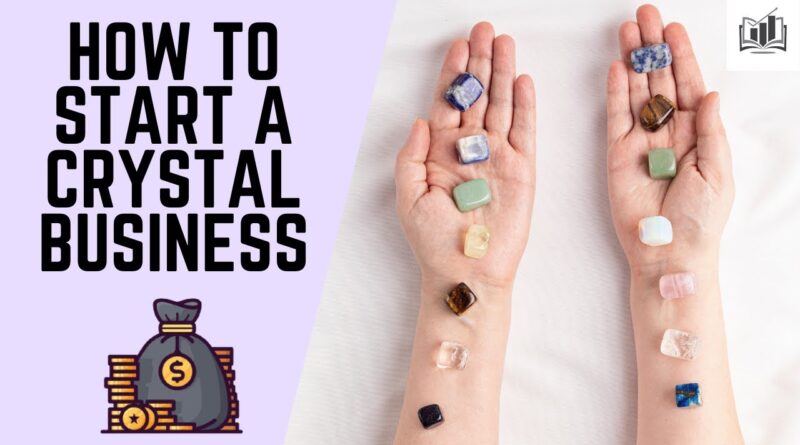How To Start A Crystal Business? A Comprehensive Guide
Starting a crystal business is more than just a commercial venture; it’s a journey into the captivating world of gemstones, crystals, and their metaphysical properties. If you have a passion for crystals and wish to turn that passion into a successful business, this in-depth guide will help you get started on the right path. We will explore every facet of starting and running a crystal business, from market research to pricing strategies, and provide insights into the profitability and costs associated with this venture. While this guide focuses on the crystal business, it’s worth noting that entrepreneurial skills can be applied across various industries. For instance, understanding customer needs and market trends is crucial whether you’re selling crystals or managing . Both businesses require a keen understanding of customer preferences, effective marketing strategies, and efficient operational management to succeed.
Research and Market Analysis
1. Dive Deep into Market Research
Before diving headfirst into your crystal business, conducting thorough market research is essential. This step will help you understand the demand for crystals in your target market, whether a physical store, an online platform, or a combination of both. Consider the following:
- Identify Your Target Audience: Determine who your ideal customers are. Are you catering to crystal enthusiasts, spiritual seekers, or a broader audience interested in wellness and metaphysical products?
- Understand Their Needs and Preferences: Know your potential customers’ needs, preferences, and purchasing habits. Are they looking for specific types of crystals or certain metaphysical properties?
- Analyze Your Competitors: Research existing crystal businesses in your area or online. What products do they offer, and how do they market them? Identify gaps in the market that you can fill.
Crafting a Solid Business Plan
2. Develop a Detailed Business Plan
A well-structured business plan is your roadmap to success. It outlines your goals, strategies, and financial projections. Here’s what your crystal business plan should include:
- Sourcing Strategy: Describe how you plan to source your crystals. Will you buy from wholesalers, attend trade shows, or collaborate with miners and artisans directly?
- Sales Channels: Define where and how you intend to sell your crystals. Options include physical retail stores, e-commerce websites, social media platforms, or a combination.
- Financial Projections: Provide detailed economic forecasts, including startup costs, monthly expenses, revenue projections, and break-even analysis.
Sourcing High-Quality Crystals
3. Find a Trustworthy Supplier
The quality of your crystals will significantly impact your business’s success. It’s crucial to establish relationships with reliable suppliers. Consider the following tips:
- Research Suppliers: Look for suppliers online, attend gem and mineral trade shows, and seek recommendations from fellow crystal enthusiasts—request samples before making substantial purchases to assess quality.
- Quality Assurance: Ensure your supplier consistently provides high-quality crystals that meet your customers’ expectations. A reputation for selling genuine, ethically sourced crystals can set your business apart.
Setting Up Your Business
4. Register and Establish Your Business
Turning your crystal passion into a legitimate business requires registration and compliance with local regulations. Here’s what you should consider:
- Business Registration: Choose a suitable legal structure for your business, such as sole proprietorship, LLC, or corporation. Register your business and obtain any necessary permits and licenses.
- Name and Branding: Select a distinctive name for your crystal business that reflects your vision and values. Create a professional logo and establish a consistent brand identity.
- Online Presence: Develop a user-friendly website or establish a robust presence on social media platforms to showcase your products and connect with potential customers.
Strategic Pricing
5. Determine Your Pricing Strategy
Pricing your crystals effectively is vital to ensure profitability. Consider the following factors when setting prices:
- Cost Considerations: Calculate your costs, including the price of crystals, shipping fees, packaging, and other overhead expenses.
- Market Research: Analyze your competitors’ pricing strategies and ensure your prices are competitive within your target market.
- Discounts and Wholesale Pricing: Explore options for offering bulk discounts or wholesale pricing to attract larger orders and retailers.
Effective Marketing
6. Craft a Comprehensive Marketing Plan
Your crystal business’s success depends on reaching your target audience effectively. Develop a comprehensive marketing plan that includes:
- Social Media Presence: Utilize platforms like Instagram, Facebook, and Pinterest to showcase your crystals, share their metaphysical properties, and engage with potential customers.
- Email Marketing: Build an email list to connect with interested customers, share promotions, and provide valuable content related to crystals and spirituality.
- Advertising Strategies: Consider online advertising, influencer partnerships, or participation in local events and fairs to increase visibility.
Exceptional Customer Service
7. Provide Outstanding Customer Service
Building a loyal customer base is critical to the long-term success of your crystal business. To achieve this, focus on delivering excellent customer service:
- Prompt Communication: Respond promptly to customer inquiries, whether through email, social media, or your website’s chat feature.
- Returns and Refunds: Offer a transparent and fair return and refund policy to build customer trust.
- Careful Packaging: Ensure your crystals are carefully packaged to prevent damage during shipping. Presentation matters in the world of crystals.
Profitability in the Crystal Business
Is the Crystal Business Profitable?
The profitability of a crystal business can vary significantly depending on various factors. Factors such as crystal quality, market demand, competition, location, and pricing strategy play a role. Here are some key points to consider:
- Quality and Rarity: High-quality and rare crystals often command higher prices and better profit margins.
- Market Demand: The demand for crystals can fluctuate, so it’s crucial to assess local and online needs regularly.
- Competition: The level of competition in your area and niche can impact your profitability. Differentiate your business to stand out.
- Location: The site can affect foot traffic and sales if you have a physical storefront.
- Pricing Strategy: Effective pricing can significantly impact your profitability. Balancing competitive prices with profitability is essential.
Remember that, like any business, risks are involved, and success is not guaranteed. Conduct thorough market research, develop a solid business plan, and continuously adapt your strategies to maximize your chances of profitability.
Starting Costs
How Much Does It Cost to Start a Small Crystal Business?
The initial costs of starting a small crystal business can vary widely depending on several factors, including:
- Types and Quantity of Crystals: Your upfront investment will depend on the types, quality, and quantity of crystals you intend to purchase initially.
- Business Registration and Licenses: Costs associated with registering your business and obtaining necessary licenses and permits can vary by location.
- Online Presence: Establishing a website or social media presence can range from a few hundred to a few thousand dollars, depending on customization and support requirements.
- Packaging and Shipping: If you plan to sell online or ship products to customers, consider the cost of packaging materials and shipping fees.
- Rent and Utilities: If you opt for a physical storefront or office space, budget for monthly rent and utility costs.
Starting a small crystal business can cost several thousand dollars or more. Creating a detailed business plan and budget is essential to ensure you have the funds to cover startup expenses until your business becomes profitable.
Crystals for Business Success
What Is the Best Crystal for Starting a New Business?
Choosing the suitable crystals to support your business journey is personal and intuitive. Several crystals are commonly associated with promoting success, abundance, and positive energy. Here are a few popular choices:
- Citrine: Known as the “merchant’s stone,” citrine is believed to attract abundance, success, and prosperity. It can also enhance confidence, motivation, and creativity—essential for a successful business venture.
- Clear Quartz: Clear quartz is a versatile crystal that amplifies intentions and energy. It promotes clarity of thought, concentration, and focus, helping you make informed decisions and stay on track with your goals.
- Pyrite: Pyrite, often called the “stone of abundance,” is believed to attract wealth, success, and good luck. It can also boost self-confidence, motivation, and energy, providing the drive to overcome business challenges.
- Green Aventurine: Green aventurine is associated with opportunities, prosperity, and good fortune. It fosters positive energy, optimism, and creativity, making it a helpful companion for those willing to take calculated risks in business.
- Black Tourmaline: Black tourmaline is a powerful grounding and protective stone. It can help ward off negative energy, promote mental clarity, and alleviate stress and anxiety—essential qualities for maintaining balance in business.
While these crystals can be valuable tools for setting intentions and enhancing your energy, business success also requires practical actions and decisions. For more information, visit linxlegal. Crystals can complement your efforts but should not replace professional advice or business acumen.
Pricing Your Crystals
How Much Can Crystals Be Sold For?
The selling price of crystals varies widely based on several factors, including the type of crystal, its quality, size, rarity, and market demand. Here’s a rough overview:
- Common Crystals: Common crystals like amethyst, clear quartz, and rose quartz can typically be sold for a few dollars per piece, depending on their size and quality.
- Rarer Crystals: Rare and unique crystals such as moldavite, larimar, or alexandrite can command much higher prices, ranging from hundreds to thousands of dollars per piece.
- Custom Jewelry: Crystals incorporated into custom jewelry designs can fetch higher prices due to craftsmanship and unique designs.
- Specialty Items: Specialty items like crystal grids, energy-infused products, or rare crystal specimens can also be sold at premium prices.
To determine the appropriate selling price for your crystals, consider your costs, profit margins, target market, and local competition. Regularly assess market trends and adjust your pricing strategy to remain competitive and profitable.
Conclusion
Starting a crystal business can be a rewarding and spiritually fulfilling endeavor. However, success requires careful planning, dedication, and continuous effort. By conducting thorough market research, sourcing high-quality crystals, implementing effective marketing strategies, and offering exceptional customer service, you can turn your passion for crystals into a thriving business.
Remember that while crystals can enhance your journey, the key to business success lies in practical decisions, hard work, and a genuine connection with your customers. Embrace the world of crystals with enthusiasm and authenticity, and your crystal business can shine brilliantly in the market.
FAQs: Starting a Crystal Business
1. To start a crystal business, Is it necessary to have extensive knowledge of crystals and metaphysical properties?
While knowledge of crystals and their metaphysical properties can be beneficial, starting a crystal business is not an absolute requirement. You can collaborate with experts, learn as you go, and rely on reputable sources for information about crystals. Passion and dedication can drive your success in this venture.
2. How do I know if my crystals are ethically sourced?
Ethical sourcing of crystals is crucial for your business’s reputation. To ensure your crystals are ethically sourced, establish relationships with suppliers prioritizing ethical practices, such as fair labor conditions and environmentally responsible mining. You can also seek certifications from organizations like the Responsible Jewelry Council for added assurance.
3. Are there any legal restrictions on selling certain types of crystals?
In some regions, there may be legal restrictions or regulations regarding the sale of specific types of crystals. Researching and complying with local, state, and federal laws regarding the sale and importation of crystals is essential. Additionally, stay informed about any updates or changes in regulations that may affect your business.
4. How can I create an effective online presence for my crystal business?
Creating an effective online presence involves building a user-friendly website, engaging on social media platforms, and utilizing e-commerce tools. Invest in professional web design, showcase high-quality images of your crystals, and create informative content related to crystals and their uses. Engage with your audience through social media by sharing visually appealing posts, educational content, and customer testimonials.
5. Can I sell crystals internationally, and what are the considerations for international sales?
Selling crystals internationally is possible, but it comes with considerations such as customs regulations, shipping costs, and import/export restrictions. Research the rules and requirements for each country you plan to ship to, including any restrictions on specific crystal types. Consider partnering with experienced international shipping providers to streamline the process.
6. How can I differentiate my crystal business in a competitive market?
To stand out in a competitive market, focus on what makes your crystal business unique. This could include offering a diverse range of crystals, providing exceptional customer service, sharing in-depth knowledge about crystals, or creating custom crystal jewelry. Building a solid brand identity and emphasizing your commitment to quality and authenticity can also set you apart from competitors.
7. What are some effective strategies for building customer trust in a crystal business?
Building trust with customers is essential. Provide clear and transparent information about your crystals, including their sources, quality, and certifications. Implement a fair and hassle-free return and refund policy. Engage with customers through personalized communication, promptly addressing their inquiries and concerns. Showcase customer reviews and testimonials to demonstrate your credibility.
8. How can I expand my crystal business beyond selling crystals?
Expanding your crystal business can involve offering related products and services, such as crystal healing workshops, crystal energy readings, or custom crystal jewelry designs. Consider collaborating with holistic practitioners, hosting events, or creating educational content to diversify your offerings and attract a broader audience.
9. What marketing strategies effectively reach a global audience with a crystal business?
To reach a global audience, leverage digital marketing strategies such as search engine optimization (SEO), social media advertising, email marketing, and content marketing. Optimize your website for international SEO, create content in multiple languages if applicable, and use targeted advertising on global social media platforms. Consider partnering with international influencers or global distributors to expand your reach.
10. How can I stay updated on crystal trends and market demand?
Staying updated on crystal trends and market demand is crucial for the success of your business. Follow industry publications, join relevant forums and online communities, attend gem and mineral trade shows, and engage with other crystal enthusiasts. Regularly monitor social media trends, conduct surveys, and gather customer feedback to adapt to evolving market preferences.




